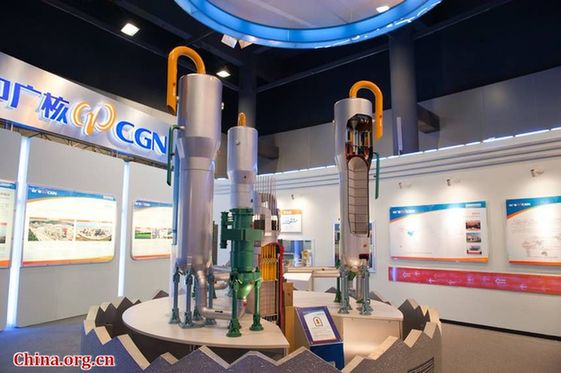China upgrades nuke emergency response efforts
- By Li Huiru
 0 Comment(s)
0 Comment(s) Print
Print E-mail China.org.cn, July 10, 2013
E-mail China.org.cn, July 10, 2013
Learning from the lessons of Wenchuan earthquake response, national nuclear emergency response exercise and Japan's Fukushima Daiichi nuclear accident, in 2011, China increased its efforts in terms of nuclear emergency response and recently approved a plan to improve the country's handling of nuclear emergencies.
|
|
|
A nuclear reactor model is on display at Daya Bay Nuclear Power Plant's exhibition room. [Chen Boyuan / China.org.cn] |
The revised "Nuclear Emergency Response Plan" was built on the original emergency measures that have been in effect since 2005. Compared to the previous version, the revised plan is more practical, detailed and functional.
"It sets clearer tasks for the government departments and companies in the event of an incident or accident," Xu Ping, deputy director of the Nuclear Emergency Response and Safety Department, said.
"It also deals with emergencies when it comes to other nuclear equipment; and accurate information must be published in a timely and transparent manner," Xu added.
Being the last line of defense in nuclear safety, nuclear emergency response is indispensable to a country's nuclear development.
"From a technical perspective, in addition to preventing accidents, the mitigation and emergency response deserve the same level of importance," said Tan Jiansheng, the vice president of China General Nuclear Power Corporation.
As a remedy for the high pollution caused by fossil fuels, China's nuclear power industry is quickly developing. There are now 17 reactors in operation and 28 more under construction.
Ye Qizhen, member of the Chinese Academy of Engineering stressed the importance of developing nuclear energy.
"The development of nuclear power, in our country, will help break the energy and environmental constraints, safeguard the energy and realize a low-carbon development," said Ye, who is also the chief designer of the second phase of the Qinshan nuclear project. "It will become an important pillar of China's future sustainable energy system."
Pan Ziqiang, member of the Chinese Academy of Engineering, said the Fukushima Daiichi nuclear accident won't happen in China.
"Nuclear energy is clean and safe," Pan said. "Despite the fact that the Fukushima nuclear disaster happened in Japan, we cannot deny the superior properties of nuclear energy. As a populous country with limited energy and resources, it's the key to ensure China's sustainable development of energy." Pan is also the head of the Science and Technology Committee of China National Nuclear Corporation
Pan explained that the Chernobyl disaster occurred in April 1986 and was due to security flaws in the design of the reactor and the lack of professionalism of the staff. While Fukushima nuclear disaster occurred after a strong earthquake and a tsunami - very rare conditions that won't happen in China.
"With only a strong earthquake it would have not happened," Pan said. China's nuclear power plants are all located in low seismically active zone. All of them [the plants] have excellent anti-seismic performance that can endure possible earthquakes."







Go to Forum >>0 Comment(s)